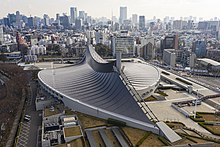1964 Summer Olympics
The 1964 Summer Games were the first Olympics held in Asia, and marked the first time South Africa was excluded for using its apartheid system in sports.Certain events such as the sumo wrestling and judo matches, sports popular in Japan, were tried out using Toshiba's new colour transmission system, but only for the domestic market.The entire 1964 Olympic Games was chronicled in the ground-breaking 1965 sports documentary film Tokyo Olympiad, directed by Kon Ichikawa.Tokyo won the rights to the Games on 26 May 1959 at the 55th IOC Session in Munich, West Germany, over bids from Detroit, Brussels and Vienna.[33] Ninety-four nations participated in the 1964 Games.Sixteen nations made their first Olympic appearance in Tokyo: Algeria, Cameroon, Chad, Congo, Côte d'Ivoire (as Ivory Coast), Dominican Republic, Libya (but it withdrew before the competition), Madagascar, Malaysia, Mali, Mongolia, Nepal, Niger, Northern Rhodesia, Senegal, and Tanzania (as Tanganyika).[citation needed] Indonesia was banned from the 1964 Olympics, due to its refusal to allow Israeli and Taiwanese athletes visas at the 1962 Asian Games.The first regularly scheduled train ran on 1 October 1964, just nine days before the opening of the games, transporting passengers 515 kilometers (320 mi) in about four hours, and connecting the three major metropolitan areas of Tokyo, Nagoya, and Osaka.Two subway lines totaling 22 kilometers (14 mi) were also completed in time for the games, and the port of Tokyo facilities were expanded to handle the anticipated traffic.Pins with a kappa were made annually beginning in 1956 for the Tokyo Sport festival, with the 1964 edition specifically commemorating the Olympics.[45] This includes sports-related costs only, that is, (i) operational costs incurred by the organizing committee for the purpose of staging the Games, e.g., expenditures for technology, transportation, workforce, administration, security, catering, ceremonies, and medical services, and (ii) direct capital costs incurred by the host city and country or private investors to build, e.g., the competition venues, the Olympic village, international broadcast center, and media and press center, which are required to host the Games.[citation needed] The 1964 Summer Olympics in Tokyo celebrated Japan's progress and reemergence on the world stage.[46] To host such a major event, Tokyo's infrastructure needed to be modernized in time for large numbers of expected tourists.Enormous energy and expense was devoted to upgrading the city's physical infrastructure, including new buildings, highways, stadiums, hotels, airports and trains.The Studio Ghibli film From Up on Poppy Hill takes place one year before the Tokyo Olympics and refers to the upcoming games.








1964 Summer ParalympicsNationssportsClosingOpened byEmperorShōwaIOC PresidentAvery BrundageCauldronYoshinori SakaiStadiumNational StadiumRome 1960Mexico City 1968Innsbruck 1964Grenoble 1968Bid processbid detailsflag bearersMedal tablemedalistsClosing ceremonyParalympicsJapaneseHepburnmulti-sport event1940 Summer OlympicsHelsinkiinvasion of ChinaWorld War IIIOC SessionSouth Africa was excludedapartheid systemInternational Olympic Committee1960 OlympicsSyncomgeostationaryRelay 1ToshibaTokyo OlympiadKon IchikawatyphoonMexico CityCOVID-19 pandemic2020 Summer OlympicsWinter OlympicsSapporoNaganoWest GermanyTorontoDetroitUnited StatesViennaAustriaBrusselsBelgiumAbebe BikilaEddie KelliherYūji KosekiOlympic flameHiroshimaan atomic bombJapan's postwar reconstructionKumi-daikovolleyballAnton GeesinkJapanese women's volleyball teamwomen's pentathlonshot puthigh jumphurdlingsprintlong jumpOsamu WatanabeLarisa LatyninaMichael PhelpsCzechoslovakianVěra ČáslavskáDawn FraserVyacheslav IvanovrowingDon SchollanderEthiopiamarathonSharon StouderPeter SnellBilly MillsBob HayesJoe Frazierheavyweight championcinderfiberglasspole vaultingZambiaTōkaidō ShinkansenTokyo StationShin-Ōsaka StationRanatunge KarunanandaCeylon10,000 metersDivingSwimmingWater poloAthleticsBasketballBoxingCanoeingCyclingEquestrianFencingField hockeyFootballGymnasticsModern pentathlonSailingShootingWeightliftingWrestlingBaseballkyūdō1964 Summer Olympics medal tableSoviet UnionUnited Team of GermanyHungaryPoland